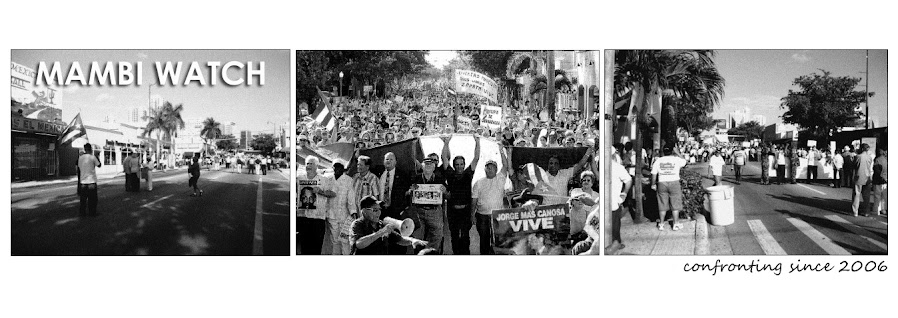 I'm very happy to see that the immigration case of Luis Posada Carriles is getting new attention because sometimes in Miami all one hears are the same voices when it comes to Posada: local Spanish-language media outlets, the Miami Herald or long-time anti-Posada activists. The atmosphere tends to create familiar echo chambers around the case. Well, yesterday legal news publication Texas Lawyer gave us a very insightful and objective report.
I'm very happy to see that the immigration case of Luis Posada Carriles is getting new attention because sometimes in Miami all one hears are the same voices when it comes to Posada: local Spanish-language media outlets, the Miami Herald or long-time anti-Posada activists. The atmosphere tends to create familiar echo chambers around the case. Well, yesterday legal news publication Texas Lawyer gave us a very insightful and objective report.Senior reporter John Council gives a brief summary of the recent ruling by the Fifth US Circuit Court of Appeals that reversed last year's court decision allowing Luis Posada Carriles to walk free, and includes many important interviews with other experts of immigration law. Among the experts are: David Deitch, a former prosecutor of the Justice Department; Kathleen Walker, past president of the American Immigration Lawyers Association (AILA); and Michael A. Olivas, an immigration law professor at the University of Houston Law Center. Council also includes an interview with a criminal law attorney, Robert Webster, concerning the Posada case which can be viewed on YouTube here.
Not surprisingly, ALL the persons interviewed by Council point out that "Posada is not the average immigrant who applies for naturalization," and thus concerns about government abuse of authority in Posada's immigration case must be held to a different standard. "It's a horse of a different color," explains Michael Olivas to Texas Lawyer.
While some may easily view this as prejudicial or discriminatory, the recent ruling by the US Fifth Circuit makes it very clear that no established rules or procedures were broken in the Posada case, and that Posada was provided all his rights under due process. The ruling further casts serious doubts about last year's opinion (by Judge Kathleen Cardone) which accused the US government of "fraud, deceit and trickery," and using Posada's naturalization process as "a pretext for a criminal investigation."
John Council's report for Texas Lawyer sums up well the Fifth Circuit's ruling, so I encourage people to take the time to read it (if you prefer it over the 35-page court document[PDF]). But, I will point out what I thought were the strongest points in the decision.
- The ruling points out (with precedent) that the US government DOES have the power to conduct both civil and criminal procedures without violating a person's right to due process. Though, this power has its limits, and each case must be reviewed carefully.
- Posada was not "tricked" in his naturalization interview because "[the US] government] did warn Posada (in the presence of Posada’s lawyer) at the beginning of the interview that, among other things, he could exercise his right against self-incrimination if he thought that an answer would incriminate him, lying could subject him to criminal penalties, and any statement he gave could be used in any legal or administrative proceeding."
Furthermore, "Posada, not the government, triggered with his naturalization application a civil adjudicatory process that, by regulation, calls for both an investigation of the applicant and an interview."
- Suspicions that Posada was being setup by the US Justice Department are also unfounded because all evidence indicates Posada was given a fair immigration proceeding. The Fifth Circuit countered the description of Posada's "anomalous" two-day interview:
"More to the point is the undeniable fact that, given his history and notoriety, Posada was a highly unusual applicant. There is simply no reason to expect his naturalization interview to approximate that of a 'typical' applicant."
There are other excellent points in the Fifth Circuit's ruling describing Posada's immigration process as "bona fide" and an appropriate examination of the applicant's "moral character." But, the best part was the opinion showing that the interview transcripts and tapes has no reason to be thrown out from the original trial. According to the Fifth Circuit:
"It was not permissible for the district court [under Judge Kathleen Cardone] to suppress Posada’s statements at the interview unless translation errors affected the crucial questions and answers relevant to the false statements charged in the indictment in such a way that these statements, as a matter of law, may not form the basis for a false statements conviction. Otherwise the matter of Posada’s understanding of the questions should have been left to the jury."
Plain and simple, Judge Cardone basically ignored the basis of the 7-count criminal indictment against Posada which were found in the tapes and transcript, well translated and understood by Posada and the interpreter during the naturalization interview. The basis of those criminal indictments will be discussed here on Mambi Watch soon.
Anyway, John Council for Texas Lawyer gives us an indication that Posada's legal team will have a very tough road ahead as they attempt to take this case to the Supreme Court. But, as noted, most of the legal experts quoted in the article don't believe this particular case has a chance.
But, with Luis Posada Carriles, you never know what's going to happen next. In the meantime, expect Posada and his supporters to continue collecting funds for his legal expenses. But, since the negative reaction from his last public appearance, its seems that Posada may now keep a low profile.
[Photo above by C.M. Guerrero/El Nuevo Herald]
[Part 1]
